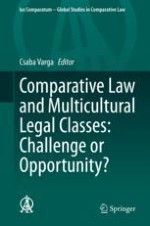2020 | OriginalPaper | Chapter
Brazilian Experience on Comparative Law: Much to Do, and Multicultural Legal Classes as an Opportunity
Author : Melina Girardi-Fachin
Published in: Comparative Law and Multicultural Legal Classes: Challenge or Opportunity?
Publisher: Springer International Publishing
Activate our intelligent search to find suitable subject content or patents.
Select sections of text to find matching patents with Artificial Intelligence. powered by
Select sections of text to find additional relevant content using AI-assisted search. powered by
